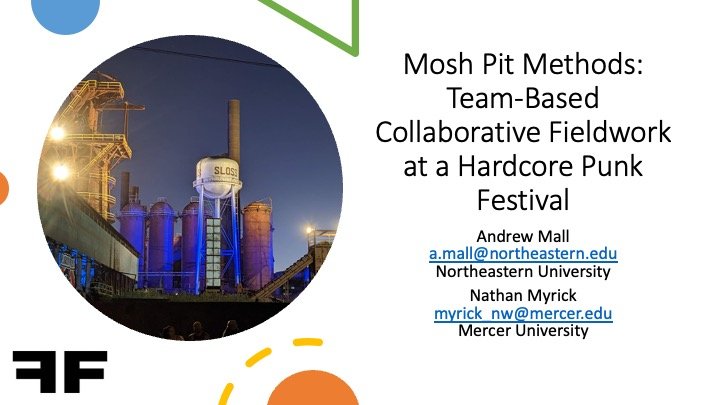Mosh Pit Methods: Team-based Collaborative Fieldwork at a Hardcore Punk Festival
Society for Ethnomusicology
SEM, Ottawa, Ontario, Canada, October 21, 2023.
Co-authored with Nathan Myrick.
Abstract
In The Chicago Guide to Collaborative Ethnography (2005; cf. 2021), Luke Lassiter argues for a reciprocal methodology that engages interlocutors in reading, interpreting, and producing ethnographic texts—not merely in collecting ethnographic data, as fieldwork “consultants” or “informants,” nor in responding to ethnographic writing, as in “dialogic editing” (Feld 1990). Collaborative ethnography, according to Lassiter (2021), is now “a given condition of any given ethnographic project … a pre-existing circumstance, a foregrounded and taken-for-granted aspect of our work together” that reflects the changing and subjective realities of multi-sited, reflexive fieldwork with multiple collaborators, outputs, and audiences.
Our longitudinal research at Furnace Fest, an annual hardcore punk festival in Birmingham, Alabama, reflects this “given condition” of collaboration in our reciprocal and ongoing engagement with the festival’s organizers and its fan community. Our interlocutors regularly ask us what we learn and think about their event and community, responding to our preliminary findings with their own interpretations: we produce ethnographic knowledge together. Simultaneously, we (the two researchers) collaborate with each other and our research assistants, whom we train for fieldwork and data analysis. In this paper, we address the complexities of collaborating at these multiple levels: with each other, research assistants, festival organizers and staff, community leaders and members, and festival attendees. We argue that the methodological and pedagogical implications of team-based ethnographic fieldwork inform and are informed by the community’s needs. In attending to these challenges and opportunities, we open a conversation about the power and potential of team-based, collaborative fieldwork.
